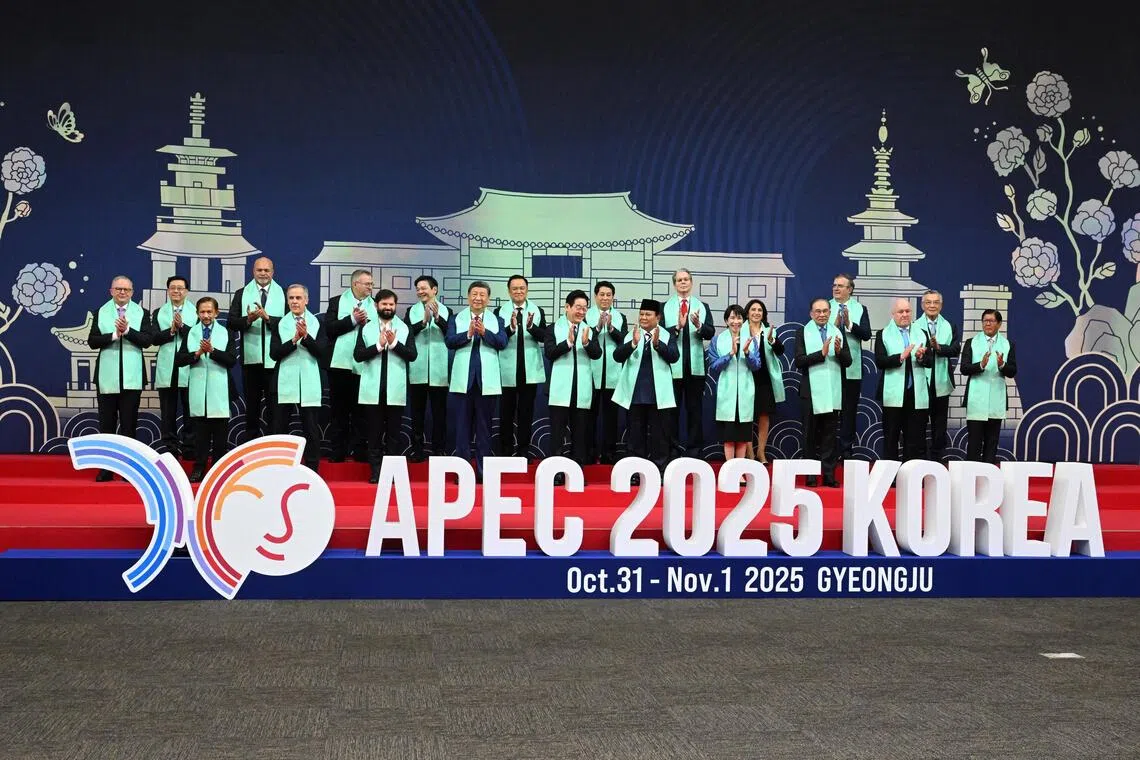US-China truce ‘welcome’ but temporary; efforts to tackle trade fragmentation must continue: PM Wong
Global trade issues cannot be solved in one meeting, but countries can work together to advance multilateralism, he says at the end of the Apec Summit

[GYEONGJU] While the recent meeting between the leaders of the US and China may have “provided some stability”, there are underlying issues that persist, said Prime Minister Lawrence Wong on Saturday (Nov 1).
On Thursday, US President Donald Trump and Chinese President Xi Jinping met on the sidelines of the Asia-Pacific Economic Cooperation (Apec) Summit, reaching an agreement on issues such as soybean purchases and rare-earth metal export restrictions.
In an interview with the Singapore media, PM Wong noted: “I think it’s more of a temporary truce and some guardrails around the relationship.”
This is “much needed and very welcomed”, he said. “But it is short-term, and I think the underlying structural issues have not been fully resolved.”
The rivalry and mutual suspicion between both countries remain, he added.
As for US trade policy in general, PM Wong said that while Trump was “warm (and) friendly” at an informal dinner hosted by South Korean President Lee Jae-myung on Wednesday, it is “quite clear” what the current administration “will continue to do where trade is concerned”.
Navigate Asia in
a new global order
Get the insights delivered to your inbox.
The Trump administration reflects the mood in US society, that trade has not been benefiting the American people, and there are also concerns around technology and security, he noted.
“How long will this continue for, no one can say. But I think… these wide trends are likely to continue not just in America but across the world,” said PM Wong.
Similarly, asked about the broader state of multilateralism after the conclusion of the Apec Summit, the prime minister replied: “These things will not change with one meeting.”
SEE ALSO
It is hard to tell how things will evolve month by month or year by year, he added, though the longer-term trend seems to be for more economic fragmentation if no actions are taken.
Still, he pointed out that countries “also have agency” and “are not passive bystanders”.
If countries can do more, such as in the Apec Summit and through other areas of cooperation, then these structural trends can be tackled, he said.

Still pro-trade
Apec’s founding mission was to promote open and free trade in the region, PM Wong noted. Today, leaders still talk about trade, but with different modifiers: not just “open and free”, but sometimes “fair and balanced”, “suggesting that it wasn’t in the past”.
Security is also increasingly discussed alongside trade, he added. Once used sparingly in trade agreements, security carve-outs are now used “very liberally” – not just for defence, but also economic, supply chain and technology security.
In this environment, and given different views across economies, “it’s still very good that in this Apec meeting, we were able to achieve a consensus amongst the leaders and ministers on the direction forward for Apec”, said PM Wong.
This is “generally still pro-trade, despite all the different modifiers” – and this is important for Singapore, he added. “Trade is existential for us.”
PM Wong said Singapore must continue to support Apec and the momentum for trade liberalisation on multiple fronts.
This includes reform of the World Trade Organization (WTO); bringing different regional groupings closer together; and pursuing new initiatives such as the Green Economy Partnership Agreement, for which negotiations were launched on the sidelines of this summit.
On specific Apec outcomes for Singapore businesses, PM Wong noted efforts to advance paperless trade, to make things more seamless and convenient for businesses.
While this “may not seem like very big news” such as tariffs or big policy changes, such reductions of frictions for trade should be pursued, he said.
As for a question on Singapore’s growth forecast, PM Wong said he would “leave that to the forecasters” in the Ministry of Trade and Industry. But he added that making short-term forecasts about Singapore’s economy “is really about forecasting what happens in the world” – which is very difficult.
As for his meeting with US Treasury Secretary Scott Bessent a day earlier, PM Wong – who is also minister for finance – said that they discussed issues in finance such as fintech, digital assets, tax policies and action against organised crime.
Trade was touched on only briefly, he noted, as trade talks are chiefly between Deputy Prime Minister Gan Kim Yong and US Secretary of Commerce Howard Lutnick.
“But (Bessent) is aware of the conversation, so I updated him on Singapore’s positions and where we stand, and hopefully he will update and share that with his colleagues in the government too, and we can continue to make progress on our trade negotiations.”
Following the conclusion of the Apec Economic Leaders’ Meeting, the leaders of the 21 Apec economies issued the Gyeongju Declaration, reaffirming their “longstanding commitment to strengthened cooperation and concrete actions to enable economic growth that benefits all”.
They recognised the rapid advancement of artificial intelligence and demographic shifts that are reshaping labour markets with “profound and long-term implications”.
Separately, Apec ministers issued a joint statement underscoring efforts to strengthen regional connectivity. They recognised the importance of comprehensive reform of the WTO, and noted the benefits of digitalisation to enhance and facilitate trade.
China is set to host next year’s Apec meeting. Speaking at the summit’s closing ceremony, Xi said this would take place in the southern city of Shenzhen.
PM Wong now heads to Seoul for an official visit at the invitation of South Korean President Lee Jae-myung.
Decoding Asia newsletter: your guide to navigating Asia in a new global order. Sign up here to get Decoding Asia newsletter. Delivered to your inbox. Free.
Copyright SPH Media. All rights reserved.




